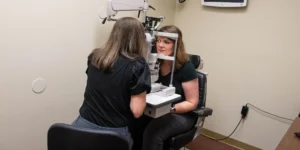It’s important for men to take their eye health seriously, whether they wear corrective eyewear or not. This blog will help you learn what you need to know about men’s eye health so you can have clear vision for years to come.
blog will help you learn what you need to know about men’s eye health so you can have clear vision for years to come.
Comprehensive eye exams are an essential part of preventative healthcare. They give eye doctors a deeper understanding of what’s going on in your eyes and help them catch issues early on. This includes problems such as high blood pressure and diabetes, which can impact your eye health as well as your overall health.
Comprehensive Eye Exams
Men may need extra reminding to get their comprehensive eye exams since they are half as likely to schedule preventative care visits when compared to women. If you don’t wear glasses or contacts then you may be wondering why comprehensive eye exams are so important. That’s because they do so much more than check and update your eyewear prescription.
Comprehensive eye exams are much more in-depth than the vision screenings you may remember from school. Those are for identifying vision problems in kids who may have trouble seeing the board. Comprehensive eye exams, on the other hand, provide your eye doctor with important insight into your visual health as well as overall health.
Along with other health issues, they help your eye doctor catch eye health issues:
- Cataracts
- Glaucoma
- Age-related macular degeneration
This makes comprehensive eye exams a pivotal part of your preventative care. They allow us to catch eye problems early on as well as overall health issues. This allows us to partner with your primary care doctor to help detect, diagnose, and provide treatment for men’s vision and other health problems.
Click here to learn more about what to expect during your Knoxville comprehensive eye exam!
High Blood Pressure
Men are more likely to have high blood pressure than women according to the CDC. Also known as hypertension, high blood pressure is when the force of blood pressing against artery walls is too high, forcing the heart to work harder.
Without treatment, consistently high blood pressure puts you at risk of:
- Heart attack
- Stroke
- Heart disease
- Aneurysm
Blood pressure can also affect your vision. Your eyes contain tiny blood vessels that supply them with blood. High blood pressure can damage those blood vessels and cause them to become thick, narrow, or torn. This can lead to vision loss if not treated immediately and effectively.
There are many ways to check and keep track of your blood pressure. One overlooked or lesser-known method is comprehensive eye exams. In fact, it’s possible that your eye doctor may catch it before your general practitioner. This is because the blood vessels in the eye are very sensitive and may indicate a problem sooner than other symptoms.
When performing a comprehensive eye exam, your eye doctor will look for signs of fluid build-up as well as swollen or inflamed blood vessels. This is done with a special microscope known as a slit-lamp and with retinal photographs. This allows your Knoxville eye doctor to help you stay on top of your heart health for both the sake of your eyes and overall health.
To learn what questions you should ask during your next comprehensive eye exam in Knoxville, TN, click here!
Diabetes
As with high blood pressure, men are more likely to develop type 2 diabetes than women and at lower weights. This makes it extremely important to monitor your blood sugar levels and risk factors however you can.
Undiagnosed or improperly managed diabetes can lead to serious vision problems including:
- Diabetic retinopathy
- Macular edema
- Cataracts
- Glaucoma
Diabetic retinopathy occurs when blood vessels in the eye begin to leak fluids such as blood. It can have few to no symptoms in the early stages, but later stages can lead to the development of abnormal blood vessels that grow to replace the damaged ones. It can also lead to macular edema, which is the swelling of the retina, resulting in blurry or cloudy vision.
The abnormal blood vessels caused by diabetic retinopathy can lead to glaucoma (increased pressure in the eye). This is due to the new vessels preventing the natural flow of fluids in and out of the eye. As fluids build up, so does eye pressure. This can eventually lead to permanent vision loss or even blindness if not treated.
Cataracts are a natural part of aging and are easily treated, although surgery is sometimes required. They are caused by the proteins in the lens clumping together as you age, causing cloudy and blurry vision. Unfortunately, diabetes can accelerate this process and cause you to require treatment, or even cataract surgery, much sooner than normal.
Comprehensive eye exams use dilation to detect a number of issues including diabetes. Special eye drops cause your eye to dilate, making it easier for your eye doctor to see the back of your eye. This lets them examine the optic nerve and blood vessels around your retina for signs of diabetes. In some cases, your eye doctor may be the first to recognize diabetes symptoms.
Comprehensive eye exams are a crucial part of preventative healthcare. Contact us today to schedule an appointment!
Like annual doctor visits and dental checkups, comprehensive eye exams are an important part of preventative healthcare. They include dilating the eye which allows eye doctors to view the inner structures that are impossible to see otherwise. This helps eye doctors detect issues that affect your overall health as well as your eye health, such as high blood pressure and diabetes.
Hardin Valley Eyecare & Optical has been serving Knoxville since 2009. Dr. Travis Thompson and Dr. Catherine Abbott specialize in the diagnosis and treatment of a wide array of eye diseases, conditions, and problems and are committed to improving the quality of life in the Knoxville community through enhanced vision. Located at 10904 Spring Bluff Way, you can schedule an appointment online or give us a call at (865) 888-0892.





